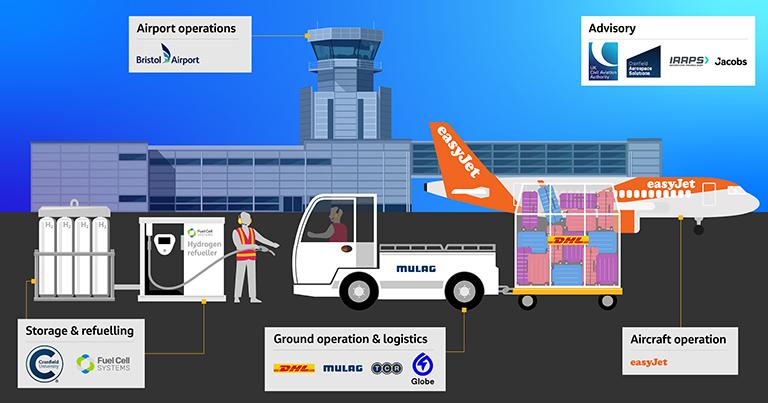A ground-breaking airside hydrogen refuelling trial, led by easyJet and supported by several cross-industry partners, has been successfully completed at Bristol Airport – the first trial of its kind at a major UK airport.
Hydrogen was used to refuel and power ground support equipment (GSE) – specifically, baggage tractors – servicing easyJet passenger aircraft. Conducted as part of the airline’s daily operations, the trial demonstrates that the gas can be safely and reliably used to refuel ground equipment in the busy, live airport environment.
The trial, dubbed Project Acorn, was in development for over a year and involved many other organisations from across aviation, engineering, logistics and academia. These include Cranfield Aerospace Solutions, Cranfield University, Connected Places Catapult, DHL Supply Chain, Fuel Cell Systems, the IAAPS research institute, Jacobs, Mulag and TCR.
“It’s without doubt that hydrogen will be an important fuel of the future for short-haul aviation, as demonstrated by the rate of innovation we’re seeing,” said David Morgan, Chief Operating Officer, easyJet. “While the technology is advancing at an exciting pace, as hydrogen isn’t used in commercial aviation today, there is currently no regulatory guidance in place on how it can and should be used, and so trials like this are very important in building the safety case and providing critical data and insight to inform the development of the industry’s first regulatory framework. This will ensure regulation not only keeps pace with innovation, but importantly also supports the industry in meeting its decarbonisation targets by 2050.”
The group intends to use the outputs of the trial to help develop industry best practice standards, provide guidance to airports, airlines, local authorities and regulators on required infrastructure changes, and support the development of a regulatory framework for hydrogen’s use on an airfield.




